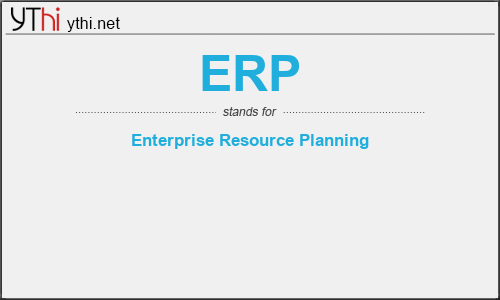What does ERP mean? What is the full form of ERP?
The full form of ERP is Enterprise Resource Planning.
Enterprise resource planning (ERP) refers to a type of software that organizations use to manage day-to-day business activities such as accounting, procurement, project management, risk management and compliance, and supply chain operations. A complete ERP suite also includes enterprise performance management, software that helps plan, budget, predict, and report on an organization’s financial results.
ERP systems tie together a multitude of business processes and enable the flow of data between them. By collecting an organization’s shared transactional data from multiple sources, ERP systems eliminate data duplication and provide data integrity with a single source of truth.
Today, ERP systems are critical for managing thousands of businesses of all sizes and in all industries. To these companies, ERP is as indispensable as the electricity that keeps the lights on.
ERP systems are designed around a single, defined data structure (schema) that typically has a common database. This helps ensure that the information used across the enterprise is normalized and based on common definitions and user experiences. These core constructs are then interconnected with business processes driven by workflows across business departments (e.g. finance, human resources, engineering, marketing, operations), connecting systems and the people who use them. Simply put, ERP is the vehicle for integrating people, processes, and technologies across a modern enterprise.
For example: consider a company that builds cars by procuring parts and components from multiple suppliers. It could use an ERP system to track the requisition and purchase of these goods and ensure that each component across the entire procure-to-pay process uses uniform and clean data connected to enterprise workflows, business processes, reporting, and analytics. When ERP is properly deployed at this automotive manufacturing company, a component, for example, “front brake pads,” is uniformly identified by part name, size, material, source, lot number, supplier part number, serial number, cost, and specification, along with a plethora of other descriptive and data-driven items. Since data is the lifeblood of every modern company, ERP makes it easier to collect, organize, analyze, and distribute this information to every individual and system that needs it to best fulfill their role and responsibility.
ERP also ensures that these data fields and attributes roll up to the correct account in the company’s general ledger so that all costs are properly tracked and represented. If the front brake pads were called “front brakes” in one software system (or maybe a set of spreadsheets), “brake pads” in another, and “front pads” in a third, it would be tough for the automotive manufacturing company to figure out how much is spent annually on front brake pads, and whether it should switch suppliers or negotiate for better pricing.
A key ERP principle is the central collection of data for wide distribution. Instead of several standalone databases with an endless inventory of disconnected spreadsheets, ERP systems bring order to chaos so that all users—from the CEO to accounts payable clerks—can create, store, and use the same data derived through common processes. With a secure and centralized data repository, everyone in the organization can be confident that data is correct, up-to-date, and complete. Data integrity is assured for every task performed throughout the organization, from a quarterly financial statement to a single outstanding receivables report, without relying on error-prone spreadsheets.
Enterprise resource planning (ERP) is defined as the ability to deliver an integrated suite of business applications. ERP tools share a common process and data model, covering broad and deep operational end-to-end processes, such as those found in finance, HR, distribution, manufacturing, service and the supply chain.
ERP applications automate and support a range of administrative and operational business processes across multiple industries, including line of business, customer-facing, administrative and the asset management aspects of an enterprise. ERP deployments are complex and expensive endeavors, and some organizations struggle to define the business benefits.
Look for business benefits in four areas: a catalyst for business innovation, a platform for business process efficiency, a vehicle for process standardization, and IT cost savings. Most enterprises focus on the last two areas, because they are the easiest to quantify; however, the first two areas often have the most significant impact on the enterprise.
ERP
means
Enterprise Resource Planning![]()
Translate Enterprise Resource Planning to other language.


Leave a Reply
You must be logged in to post a comment.